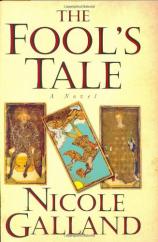Reading Group Guide
Discussion Questions
The Fool's Tale: A Novel of Medieval Wales

1. Consider Isabel's assessment of Welsh culture and law as opposed to Norman. What are the differences in the ways women are considered in the two cultures? Which culture would you rather live in?
2. How does Gwirion's role as court fool define his relationship to the court at large? What would be the modern-day equivalent of such as person? What are the pros and cons of taking on such a role?
3. One theme of the story is sovereignty. How do each of the three characters embody the struggle to achieve a form of sovereignty?
4. Many of the characters have consistent but unusual moral and ethical guidelines. What are the guiding principles behind Gwirion's behavior? Isabel's? Nobles? What are the forces that are likely to have shaped these principles?
5. Which character do you think exhibits the highest standards of moral or ethical conduct?
6. Gwirion claims to have matured at the end of the story. Do you see evidence of this? If so, how has he matured? In what ways, if any, does Isabel influence this?
7. What do you think happens to Gwirion once he walks away at the end -- both immediately and in the long term? What do you think happens to the kingdom as a whole?
8. Noble's political sovereignty is threatened in two distinct ways: by Mortimer overthrowing him and by Llewlyn undermining him. Which of these is really the greater threat?
9. Noble is very concerned with maintaining his crown. In what ways does this suggest that he is looking out for his country, and in what ways does it suggest that he is merely being prideful?
10. In what ways does their shared childhood trauma influence the ongoing relationship between Noble and Gwirion?
11. To what degree is Gwirion and Isabel's relationship influenced (for the good and for the bad) by external circumstances? And to what degree is it influenced by their own innate characters?
12. Which of the three primary relationships would be the most sustainable under more normal circumstances? Which is the most "important," or meaningful, or truest, and which is the most damaging? Why?
13. Considering the social and political realities of the time, is there a way this story could have had a different ending?
14. Which of the three characters do you like and/or respect the most, and why? If you like one, but respect another, can you explain why?
15. Noble repeatedly makes it clear that his behavior must be dictated by necessity, not his own feelings. In what ways do you think that his feelings do, despite his best efforts, influence his behavior? Do you think he suffers for not being able to act on his feelings?
The Fool's Tale: A Novel of Medieval Wales
- Publication Date: January 4, 2005
- Hardcover: 544 pages
- Publisher: William Morrow
- ISBN-10: 0060721502
- ISBN-13: 9780060721503








